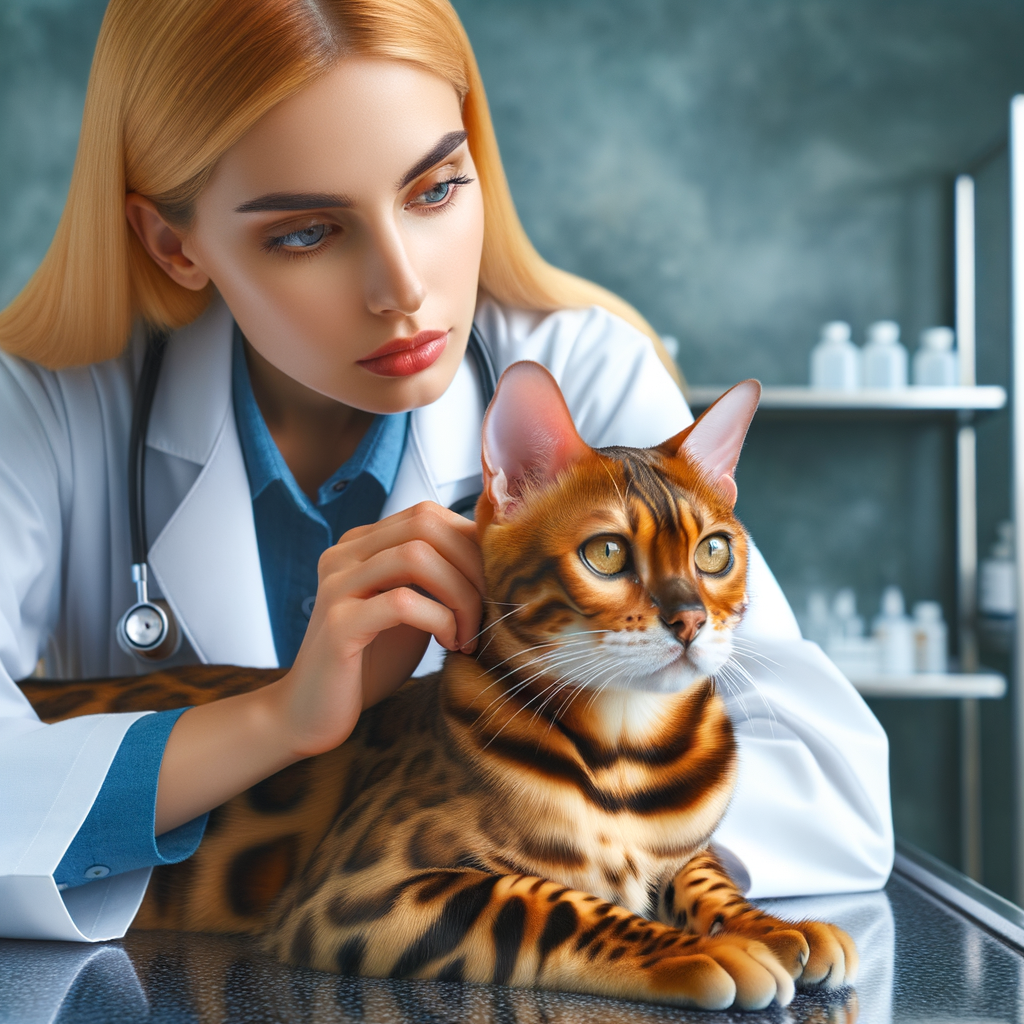
Introduction: Recognizing Signs of Illness in Bengal Cats
- Bengal cat health issues: Recognizing health problems early can make a big difference. It helps in getting timely treatment and prevents complications. Healthy cats are happier and more active.
- Common symptoms of sickness in Bengal cats: Watch out for these signs:
- Loss of appetite: If your Bengal cat stops eating, it could be a sign of illness.
- Weight loss: Sudden weight loss is a red flag.
- Vomiting or diarrhea: Frequent vomiting or diarrhea needs attention.
- Lethargy: If your cat is less active than usual, it might be sick.
- Coughing or sneezing: These could indicate respiratory issues.
Bengal Cat Behavior
Normal Bengal Cat Behavior
- Typical behaviors and traits: Bengal cats are known for their playful and energetic nature. They love to climb, jump, and explore their surroundings. These cats are also very vocal and will often “talk” to their owners with a variety of meows and chirps.
- Bengal cat’s unique characteristics: Bengals have a wild ancestry, which gives them some unique traits. They have a strong hunting instinct and enjoy interactive play. Their intelligence is high, making them quick learners. Bengals also have a love for water, which is uncommon in many other cat breeds.
Bengal Cat Behavior Changes
-
Identifying Unusual Behaviors
- Changes in Activity Level: Bengals are usually very energetic. If your cat becomes lethargic or less active, it could be a sign of illness.
- Altered Eating Habits: If your Bengal cat suddenly eats more or less than usual, this could indicate a health issue.
- Unusual Vocalizations: Increased meowing or other vocal changes can be a sign that something is wrong.
- Aggression or Fear: If your normally friendly cat becomes aggressive or fearful, it might be experiencing pain or discomfort.
-
Behavior Changes as Potential Signs of Illness
Behavior changes in Bengal cats can often be early indicators of illness. Here are some common health issues that might cause these changes:
| Behavior Change | Possible Health Issue |
|---|---|
| Decreased Activity | Arthritis, Obesity, Heart Disease |
| Increased Vocalization | Hyperthyroidism, Pain, Anxiety |
| Changes in Eating | Dental Problems, Digestive Issues, Diabetes |
| Aggression | Injury, Illness, Stress |
Common Bengal Cat Health Issues
Physical Health Problems
-
Common diseases and conditions:
- Hypertrophic Cardiomyopathy (HCM): This is a heart disease that can affect Bengal cats. It causes the heart walls to thicken.
- Progressive Retinal Atrophy (PRA): This condition affects the eyes and can lead to blindness.
- Feline Infectious Peritonitis (FIP): A viral disease that can be fatal.
-
Identifying physical symptoms of sickness:
- Changes in appetite: Eating more or less than usual can be a sign of illness.
- Weight loss or gain: Sudden changes in weight should be checked by a vet.
- Vomiting or diarrhea: These can indicate digestive issues.
- Coughing or sneezing: Respiratory problems can show up as coughing or sneezing.
- Lethargy: If your cat is less active than usual, it could be sick.
Mental Health Problems
- Bengal Cat’s Mental Health
Bengal cats are known for their intelligence and playful nature. However, just like humans, they can experience mental health issues.
Here are some key insights:
- Social Needs: Bengal cats are social animals. They need interaction with their owners and other pets.
- Stimulation: Toys, puzzles, and playtime can help keep their minds active.
- Environment: A safe and comfortable environment is essential. Ensure they have a quiet space to retreat to when needed.
Recognizing Signs of Stress or Anxiety
Recognize signs of stress or anxiety in your Bengal cat. Early detection can help in managing their mental health effectively.
Common signs include:
- Changes in Behavior: Look for changes like hiding, aggression, or excessive grooming.
- Appetite Changes: A sudden increase or decrease in appetite can be a sign of stress.
- Vocalization: Excessive meowing or yowling can indicate anxiety.
| Sign of Stress | Possible Cause |
|---|---|
| Hiding | Fear or anxiety |
| Aggression | Stress or territorial issues |
| Excessive Grooming | Boredom or anxiety |
| Changes in Appetite | Stress or illness |
Bengal Cat Veterinary Care
- Importance of Regular Vet Visits
Regular check-ups help catch health issues early. This can save your cat from serious problems later. Vets can also give advice on diet and care.
According to experts, cats should visit the vet at least once a year. Kittens and older cats may need more frequent visits. Regular vet visits ensure your Bengal cat stays healthy and happy.
- What to Expect During a Vet Visit
During a vet visit, the vet will do a physical exam. They will check your cat’s weight, teeth, and coat. The vet may also listen to your cat’s heart and lungs. This helps them find any hidden issues.
Sometimes, the vet might suggest blood tests or vaccinations. These tests can show if your cat has any health problems. Vaccinations protect your cat from diseases.
Don’t forget to ask the vet any questions you have. They are there to help you and your Bengal cat.
| Age | Vet Visit Frequency |
|---|---|
| Kitten (0-1 year) | Every 3-4 weeks |
| Adult (1-7 years) | Once a year |
| Senior (7+ years) | Twice a year |
Preventive Measures and Wellness Tips
Bengal Cat Wellness Tips
-
- Proper nutrition and exercise
A balanced diet helps maintain their energy levels and overall health. Bengals are active cats, so they need high-quality cat food rich in protein. Play with your cat daily using toys like feather wands or laser pointers. This keeps them fit and mentally stimulated.
-
- Importance of regular grooming
Grooming your Bengal cat regularly helps keep their coat shiny and healthy. Brush them at least once a week to remove loose fur and prevent matting. Regular grooming also helps you check for any skin issues or parasites. Additionally, it’s a good bonding time for you and your cat.
Preventing Common Bengal Cat Diseases
- Vaccinations and Preventive TreatmentsThey protect against diseases like rabies, feline distemper, and feline leukemia. Regular vet visits ensure your cat gets the right vaccines at the right times.
Preventive treatments also include flea and tick control. These pests can cause serious health issues. Use vet-recommended products to keep them away.
- Environmental Factors and Their Impact on HealthThe environment your Bengal cat lives in affects its health. A clean home reduces the risk of infections. Make sure to clean litter boxes daily and keep food and water dishes clean.
Also, provide a stress-free environment. Stress can weaken your cat’s immune system. Create a safe space with plenty of toys and scratching posts.
Ensuring Your Bengal Cat’s Health
- Importance of vigilance in spotting signs of illness: Always watch for changes in your cat’s behavior, appetite, or appearance. Early detection of illness can make a big difference in treatment success.
- Commitment to regular veterinary care: These visits help catch potential health issues before they become serious. According to Wikipedia, regular vet visits can prevent many common diseases.
- Role of a healthy lifestyle in preventing diseases: A balanced diet, regular exercise, and mental stimulation are key to your Bengal cat’s health. Providing a healthy lifestyle can prevent many illnesses and keep your cat happy.
| Key Points | Details |
|---|---|
| Vigilance | Spotting signs of illness early |
| Veterinary Care | Regular check-ups and preventive care |
| Healthy Lifestyle | Balanced diet, exercise, and mental stimulation |






